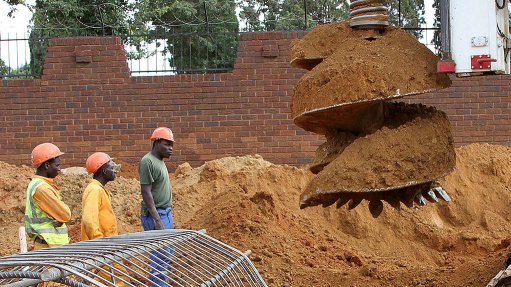
GEOTECHNICAL INVESTIGATIONS NECESSARY These tests provide invaluable information regarding the physical properties of soil and rock on a site
Structural engineers should base the design of a building, including its foundations, on detailed and official geotechnical investigations to ensure durable and cost-effective foundations, says piling contractor Gauteng Piling chairperson Nico Maas.
These tests – typically conducted by geotech-nical engineers or engineering geologists – provide invaluable information on the physical properties of soil and rock on a site, determining whether a structure will need normal, piled or raft foundations.
Maas points out that the private sector is alarmingly ignorant about the need for soil investigations. For example, a client recently suggested that a rod could simply be hammered into the ground to avoid paying for proper geotechnical tests. “This would invariably not give a reliable answer, as soil conditions vary across a site. It also does not indicate the properties of the soil.”
Owing to the current economic crisis, which is impacting significantly on the construction sector, Gauteng Piling’s clients frequently regard geotechnical soil tests as a nonessential practice that can either be watered down or totally eliminated to save costs.
“This attitude inevitably leads to increased costs at a later stage, when it is discovered that suitable material is not present to secure the foundation,” says Maas, adding that a client then often has to settle for a total redesign of the building at substantially increased costs.
He adds that contractors are struggling to find and retain clients in the current economic slump and are, therefore, reluctant to agitate developers or property owners by insisting on initial soil investigations to determine the correct foundations.
Maas believes that clients should be obliged to insist on a proper soil investigation and suggests that geotechnical investigations should be controlled by a body to which negligence can be reported. This is in addition to a register that forms part of the Register of Projects at the Construction Industry Development Board confirming that a geotechnical investigation was carried out. He is confident that this would go a long way towards mitigating any future mishaps.
“Structural engineers need soil investigations to arrive at cost-saving designs for any structure. On a R200-million project, sufficient geotech-nical investigations could cost R200 000, which is a small price to pay if you consider what the cost, and other more serious consequences, could be if durable foundations were not provided.”
Maas notes that the geotechnical investigation has to be complete before the design is finalised, which is why it needs to be done as early as possible. This, in turn, will allow for the first estimate of a building’s cost and enable a company to make provisions for the cost of expensive foundations when required.
Soil investigations are beneficial, as they will dictate whether the building should be moved to a more suitable location to avoid having to lay more expensive foundations.
He explains that different pile types are required for different soil conditions. For example, in a dolomite area, the depth of the bedrock in each pile position needs to be established and this may vary by up to 20 m between adjacent piles. In collapsing grain granites, the piles have to be founded on rock and in deep sandy soils, the loads can be carried in friction.
Gauteng Piling has completed more than 1 500 major piling contracts since it was founded by Maas in 1996. Among these are the 500 piles provided for the Mall of Africa shopping centre, currently under construction in Midrand; the Cosac building, comprising extensions to the Market Theatre complex, in the Johannesburg central business district; extensions to Four-ways Mall and the Cresta shopping centre, in Johannesburg; a new City Lodge hotel, in Newtown; the Fire & Ice hotel and the Grove shopping centre, both in Pretoria; and the refurbishment and upgrade of the Kyalami grand prix circuit.